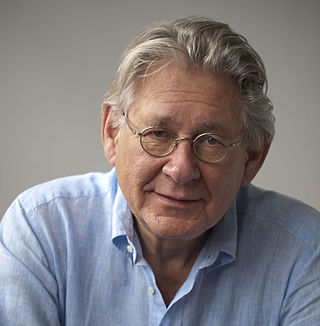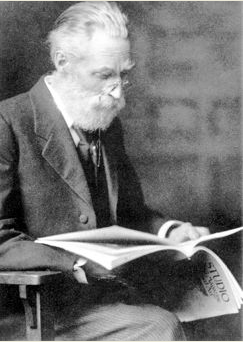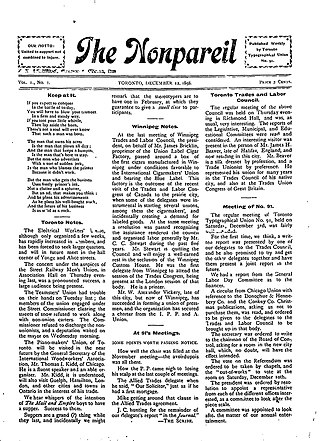Related Research Articles

The Winnipeg General Strike of 1919 was one of the most famous and influential strikes in Canadian history. For six weeks, May 15 to June 26, more than 30,000 strikers brought economic activity to a standstill in Winnipeg, Manitoba, which at the time was Canada's third largest city. In the short term, the strike ended in arrests, bloodshed, and defeat, but in the long run it contributed to the development of a stronger labour movement and the tradition of social democratic politics in Canada.

Leo Victor Panitch was a distinguished research professor of political science and a Canada Research Chair in comparative political economy at York University. From 1985 until the 2021 edition, he served as co-editor of the Socialist Register, which describes itself as "an annual survey of movements and ideas from the standpoint of the independent new left". Panitch himself saw the Register as playing a major role in developing Marxism's conceptual framework for advancing a democratic, co-operative and egalitarian socialist alternative to capitalist competition, exploitation, and insecurity.
The Canadian Historical Association is a Canadian organization founded in 1922 for the purposes of promoting historical research and scholarship. It is a bilingual, not-for-profit, charitable organization, the largest of its kind in Canada. According to the Association, it "seeks to encourage the integration of historical knowledge and perspectives in both the scholarly and public spheres, to ensure the accessibility of historical resources, and to defend the rights and freedoms of emerging and professional historians in the pursuit of historical inquiry as well as those of history degree holders who utilize the analytical, research, communication, and writing skills they acquired during their studies to pursue a variety of career paths inside or outside of academia."

Albert Edward Smith, known as A. E. Smith, was a Canadian religious leader and politician. A social gospeller, Smith was for many years a minister in the Canadian Methodist Church before starting his own "People's Church". He served in the Legislative Assembly of Manitoba from 1920 to 1922 as a Labour representative. In 1925, he became a member of the Communist Party of Canada.
Alfred Goldsworthy Bailey, was a Canadian educator, poet, anthropologist, ethno-historian, and academic administrator.

This is a bibliography of major works on the History of Canada.
Elena Miller, originally known as Yelena Borisovna Olshanskaya, is a Russian who, as alleged by the Canadian Security Intelligence Service (CSIS), lived in Canada as a spy, using the name of a dead child as a cover. Olshanskaya later lost the right to immigrate back to Canada to live with her second husband, Canadian Peter Miller.
Craig Heron is a Canadian social historian and public intellectual with a broad interest in labour and cultural history. A former president of the Canadian Historical Association, he is a professor emeritus at York University.
New Hogtown Press was a Canadian left-wing publisher active during the 1970s and 1980s.
The Canadian Socialist League (CSL) was the first nationwide socialist organization founded in Canada. It originated in Montreal in 1898, but was strongest in Ontario and British Columbia. The leaders espoused a moderate socialism based on Christian reform principles. Members of the league formed provincial socialist parties. In 1905 these parties merged into the Socialist Party of Canada (SPC).
Colonel Charles Frederick Hamilton (1879–1933) was a Canadian intelligence officer and newspaper journalist.
Josaphat Brunet (1902-1974) was a senior police officer in Canada. In 1956 he was the founding director of the RCMP Security Service. In 1958 he was promoted to Deputy Commissioner of the Royal Canadian Mounted Police. Following his retirement from the RCMP he became, briefly, the director of Security for the National Bank of Canada. Later in 1960 he was appointed Director General of the Sûreté du Québec, a post he held for five years.
Bower Featherstone was a Canadian civil servant who was convicted of espionage in 1966.
George Weston Wrigley (1847–1907) was a Canadian journalist and social reformer. He was a believer in the Social Gospel and was an opponent of industrial capitalism, which he blamed for many social ills. He was the editor of several newspapers that promoted reform in the later part of the 19th century.

Thomas Phillips Thompson was an English-born journalist and humorist who was active in the early socialist movement in Canada.

Militant Minority: British Columbia Workers and the Rise of a New Left, 1948-72 is a 2011 book written by Ben Isitt and published by University of Toronto Press.
Harry Clare Pentland was a Canadian economic historian. Pentland studied labour and economic history. He served as president of the Manitoba Historical Society from 1963 to 1965. In 1970, the MHS awarded him a Manitoba Centennial Medal. His papers are held at the University of Manitoba. Archives.

The Toronto Typographical Union (TTU) was an early Canadian trade union in the printing industry. Founded in 1832, it came to prominence in 1872 when it organized a major strike in Toronto. Membership declined in the mid- to late-20th century as printing turned digital. By 1994, TTU had been absorbed by the Communications, Energy and Paperworkers Union of Canada.

The Canadian Labour Revolt was a loosely connected series of strikes, riots, and labour conflicts that took place across the Dominion of Canada between 1918 and 1925, largely organized by the One Big Union (OBU).

Who Killed Canadian History? is a 1998 book by Canadian historian J. L. Granatstein. The book argues that Canadians lack national unity because of their failure to teach their country's history. Granatstein contends that multiculturalism, social historians and weak history teaching standards are responsible for Canada's lack of a historical narrative. He advocates for a greater emphasis on the study of Canadian history in schools and university history departments, especially political and military history.
References
- ↑ "Professors Emeriti and retirees". www.unb.ca. Retrieved September 25, 2013.
- ↑ Kealey, Gregory S. (Fall 2016). "Community, Politics, and History: My Life as a Historian". Canadian Historical Review. 97 (3): 404–425. doi:10.3138/chr.97.3.Kealey. S2CID 157086604.
- ↑ "Professor elected to royal society," St. John's Telegram, 29 July 1999.